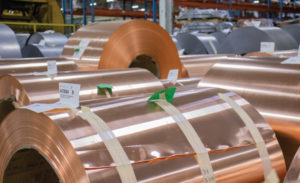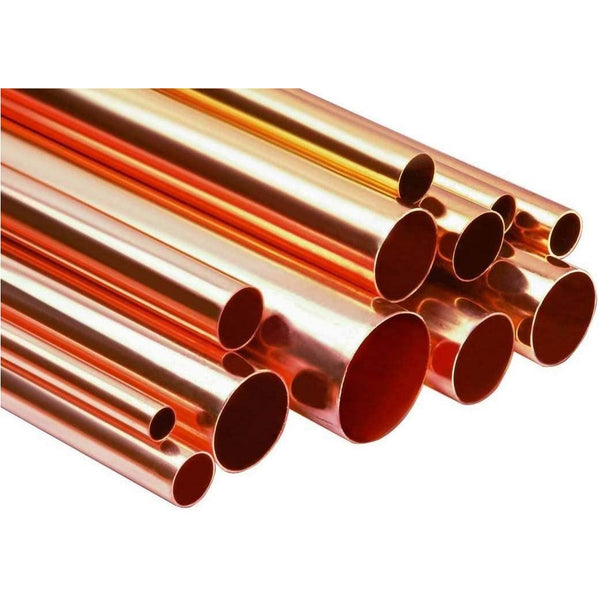From Art to Performance: The Many Applications of Distinct Copper Products
From Art to Performance: The Many Applications of Distinct Copper Products
Blog Article
Discovering the Diverse Applications of Copper Products in Modern Industries
From enhancing the effectiveness of electric systems to playing a vital role in eco-friendly power innovations, the adaptability of copper is evident. As industries significantly focus on technology and sustainability, the diverse applications of copper require a closer evaluation, especially concerning their prospective effect on future environmental methods and technological improvements.
Electric Applications of Copper
Copper is a crucial product in the electrical market, making up about 60% of the total need for non-ferrous metals worldwide - Copper Products. Its remarkable electrical conductivity, which is virtually twice that of light weight aluminum, makes it the recommended option for a broad variety of electrical applications. From circuitry systems in domestic and commercial buildings to high-voltage power transmission lines, copper guarantees performance and reliability in electricity distribution
In addition to circuitry, copper is integral to the manufacturing of electric parts such as transformers, generators, and electric motors. These parts take advantage of copper's thermal conductivity and malleability, crucial for warm dissipation and efficient efficiency. Copper's resistance to corrosion enhances the lifespan and toughness of electric systems, making it a cost-effective service in the long term.
The growth of renewable resource resources, such as solar and wind power, has actually additionally raised the demand for copper in electrical applications. As industries change towards lasting energy solutions, copper's function becomes a lot more essential. Generally, the convenience and efficiency qualities of copper strengthen its condition as a keystone material within the electric sector, driving technology and performance throughout different applications.
Plumbing and Piping Solutions
In modern-day plumbing systems, the option of materials significantly affects both capability and durability. Copper has actually become a preferred choice as a result of its one-of-a-kind properties, including deterioration resistance and antimicrobial characteristics. These qualities guarantee that copper piping continues to be durable and safe for carrying potable water, a vital consideration in property and commercial applications.
Among the crucial advantages of copper in pipes is its ability to endure heats and stress, making it appropriate for a variety of applications, from warm water systems to heating and cooling down networks. Furthermore, copper's adaptability enables less complicated setup in complex piping formats, minimizing the danger of leakages and failures.
Another noteworthy benefit is copper's lengthy lifespan, usually surpassing 50 years with appropriate upkeep. This durability not just reduces replacement costs yet also adds to lasting techniques by decreasing waste. Furthermore, copper's recyclability lines up with modern-day environmental requirements, advertising a circular economic climate within the pipes industry.
Copper in Renewable Resource
The convenience of copper prolongs beyond plumbing applications, playing an important role in the eco-friendly energy industry. In solar panels, copper is utilized in photovoltaic cells and wiring, helping with effective energy conversion and transmission.

In addition, as the worldwide demand for electric lorries (EVs) increases, copper's role in battery systems and billing facilities comes to be a lot more considerable. The material's ability to perform electricity effectively is important to the efficiency of EV batteries, improving array and billing rate.
Copper's Duty in Electronic devices
Electronics making counts greatly on copper's remarkable residential properties, specifically its high electric conductivity and thermal effectiveness. These qualities make copper a suitable selection for a vast array of electronic elements, including connectors, circuit boards, and electrical wiring. The steel's capacity to effectively transfer electrical signals ensures very little power loss, which is vital in high-performance digital gadgets.
Moreover, copper's thermal conductivity plays check my reference a considerable duty in warmth dissipation, securing sensitive components from overheating. This is specifically vital in modern electronic devices, where small designs lead to increased warm generation. Copper is also preferred for its malleability and ductility, allowing it to be conveniently shaped right into elaborate designs that satisfy the demands of advanced electronic applications.
With the surge of customer electronics, telecoms, and electric cars, the demand for copper in the electronic devices sector proceeds to grow. As innovations in technology advance, copper stays integral to accomplishing greater efficiency and reliability in electronic items. Its recyclability even more boosts its appeal, as producers look for sustainable options without endangering top quality. Hence, copper remains a foundation product in the ever-expanding field of electronics.
Ingenious Utilizes in Manufacturing

One noteworthy application is in additive production, where copper-based materials are used in 3D printing processes. This enables the development of light-weight elements and complex geometries, especially in the aerospace and vehicle industries. In addition, copper's thermal conductivity makes it a perfect option for warmth exchangers, improving effectiveness in commercial air conditioning systems.
Moreover, the increase of clever production has seen the consolidation of copper in IoT tools, where its conductive capacities sustain advanced sensing innovations. In the world of renewable energy, copper is essential in the production of solar panels and wind turbines, promoting much more efficient energy conversion and distribution.
As industries pursue sustainability and development, copper's adaptability and efficiency remain to place it as a vital product, driving advancements in production and adding to the growth of smarter, extra efficient items.
Conclusion
The important role of copper in eco-friendly power and its crucial function in electronic devices highlight its importance in progressing sustainable techniques. Jointly, these applications highlight copper's vital contribution to technical progress and commercial effectiveness in modern culture.
From improving the efficiency of electrical systems to playing an essential duty in renewable power innovations, the versatility of copper is obvious. As sectors progressively focus on technology and sustainability, the diverse applications of copper call for a closer examination, especially concerning their potential impact on future technical developments see it here and ecological techniques.
The growth of sustainable power resources, such as solar and wind power, has even more boosted the demand for copper in electric applications. On the whole, the versatility and performance qualities of copper solidify its status as a foundation product within the electric field, driving innovation and effectiveness throughout various applications.
The flexibility reference of copper prolongs beyond plumbing applications, playing an essential function in the sustainable power market.
Report this page